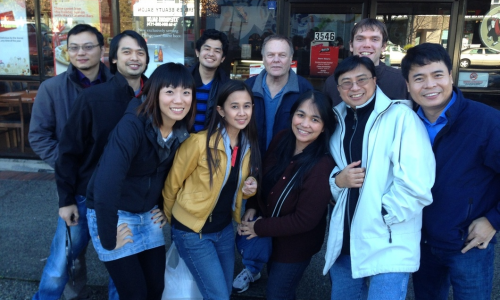
“I’m moving to Barcelona!” This was the first thing I said to my mom when I heard I got the job as an English Language Assistant through a company called Comodin Barcelona. It was an expression filled with excitement, anxiousness, and accomplishment. Most people I told were overjoyed as well, however they would always say, “Oh, but you’re in BPK-- that’s not related.” Believe me, I also thought my first co-op position would be in a physiotherapy clinic or rehabilitation centre, but I could not say “no” to the opportunity to live in a different country and to be immersed in a different culture for nine months, while at the same time gaining credits for school and acquiring the experience of a lifetime. Yes, I am in BPK, and the job I took was to teach the English language in Spain. It might not be directly related, but is it educational? Yes.
Culture Shock: From Canada to Spain
What is the difference between Canada and Spain? To begin with, there is that whole language thing. I was not required to know Spanish or Catalan fluently prior to my arrival, so I was lucky to have plenty of help with the languages from the people around me. For instance, the host-family I am staying with is more than accommodating, especially when they helped me obtain the required papers and documents for my stay. At the school where I teach, there are tutors who help me with everything I need there. That being said, fortunately enough for me, I also have a great Spanish language instructor who is helping me reach a functional level of the Spanish language.
Secondly, the culture in general, is a social one. For example, when you first walk into a room, you enter with a “Hola” or “Buenas” and there is always someone who replies paired with a smile. Or, if you are in a line at the grocery store waiting to be served and the customer in front of you is having a conversation with the cashier, that discussion takes priority over you. This is quite the opposite in Canada. However, when you are the one who is new to the country and culture, it really helps to have the warmness and friendliness, which makes it easier for you to feel less alone. Even amongst the children I work with, sure there are times they do not get along, but it never seems to last and the students always end their exchange with laughter.
Lastly, a change in culture inevitably means a change in diet. The Catalan menu is mainly Mediterranean, which means that there is plenty of olive oil, salt, cold cuts and fish. There is also an abundance of coffee and “pa i xocolata” (bread and chocolate). I am not only talking about the dinner and lunch menu though, but also snacks. For example, unsalted nuts are a difficult item to find in a Catalan grocery store and if you want some water, you will probably have to buy it. The major meals of the day undeniably differ, but the changes in small servings do not go unnoticed either.

Adapting to a New Role
Apart from the cultural differences, I have also had to adapt to my new role as an English Language Assistant. The school I am at definitely utilizes native English speakers to their full extent. Currently, I am teaching students ages 12-18, some of the teachers at the school, and an extracurricular class for a few adults who have signed up. The majority of my classes contain approximately 15-18 students. My role consists of teaching speaking and writing to the 12-18 year olds, planning class activities for those lessons, marking assignments and instituting exams. At first I felt overwhelmed. The planning, the public speaking, the language barrier, all did a great job of raising my stress levels. I am also an untrained teacher with experience only in coaching soccer for two years; I thought I was going to be in over my head. Nevertheless, with the support from my colleagues, host-family and fellow English Language Assistants at my school, I was able to find a comfortable level at which to work. I feel like I have been able to adapt to the culture well and learn some of the do’s and don’ts when trying to teach a class. For example, never go in unprepared and, if you are prepared, be ready to change the activity if it is not going as planned. Teaching is a very active role and it takes plenty of effort to do it well.

Advice to Those Going Abroad
If I were to give some advice for someone wanting to do a co-op term (or terms) abroad, I would say the most important thing is to EXPECT THE DIFFERENCES. There is a great article called “Culture Shock” (SFU International Co-op, n.d.) provided through the SFU BIL program that really helped me prepare for my trip. It outlines what feelings you may come across throughout your journey and how to manage them appropriately. I found it very useful and it has unquestionably augmented my stay. It is also important to research your new home before you arrive at your destination. What norms are different, common food items, or the different ways of being polite. For example, in Spain, men great women by doing a cheek-to-cheek kiss two times, first on one cheek, then on the other. My question is though, which side do you do first, left or right? I’ll let you find the answer. If you are in a home-stay program, it is important to recognize you are moving into someone else’s home. They may have different rules than you are accustomed to and it is important to respect those rules while at the same time setting your own boundaries. For example, if your bedroom door is closed, it means do not disturb. Or in my case, I am here for the family to better their English so it is important for me to spend time with the children and parents while speaking in English so their investment is not wasteful.
At the end of the day, my role is not directly related to BPK, but what I am gaining is an experience I would not be able to get if I had stayed in Canada. I am living in a world with different norms and in a place where I cannot communicate perfectly, so I really do learn something new everyday. Each day presents itself with a new challenge, and each day I observe something new about how the world works a quarter of the way around the planet.
Beyond the Blog
- Visit the International Co-op website for more information on opportunities like Nick's!
















